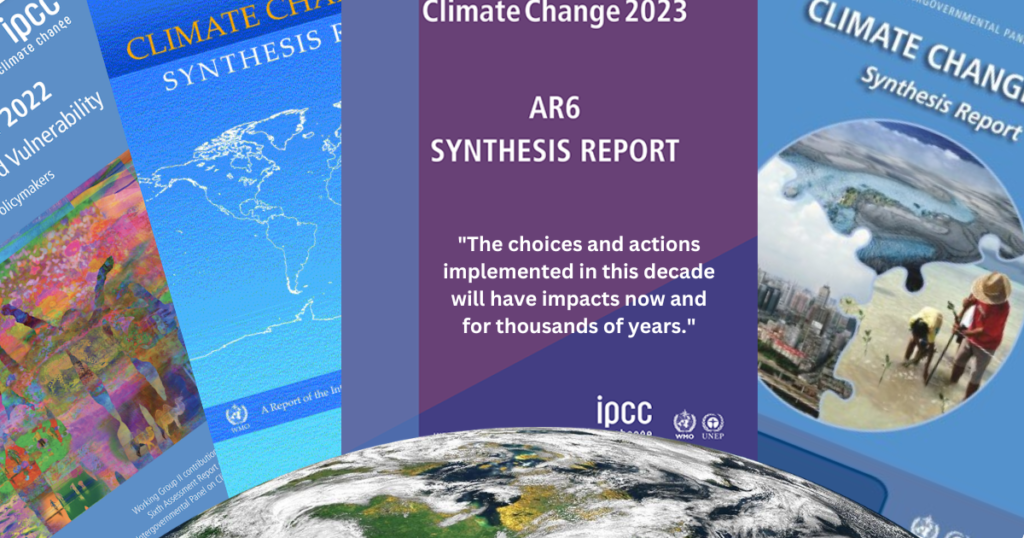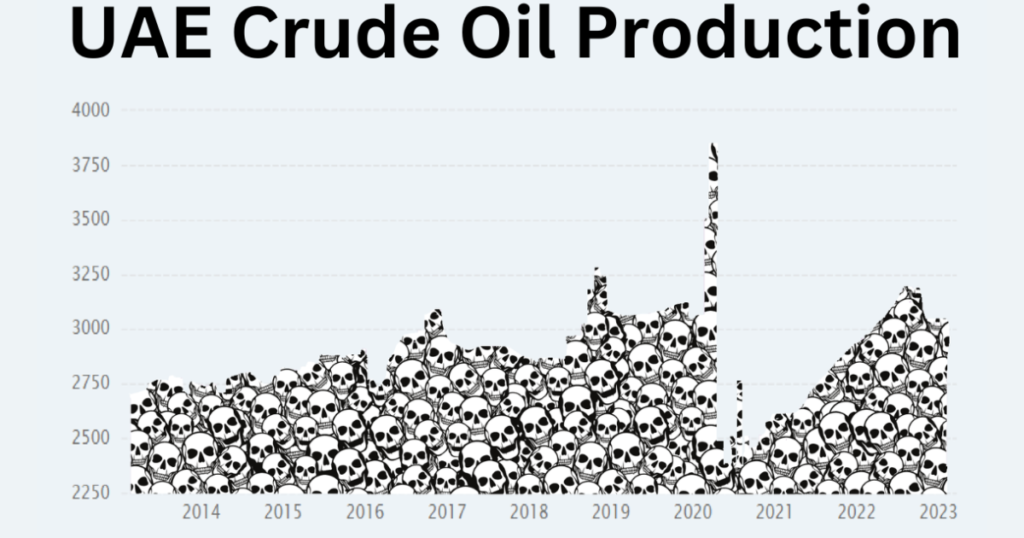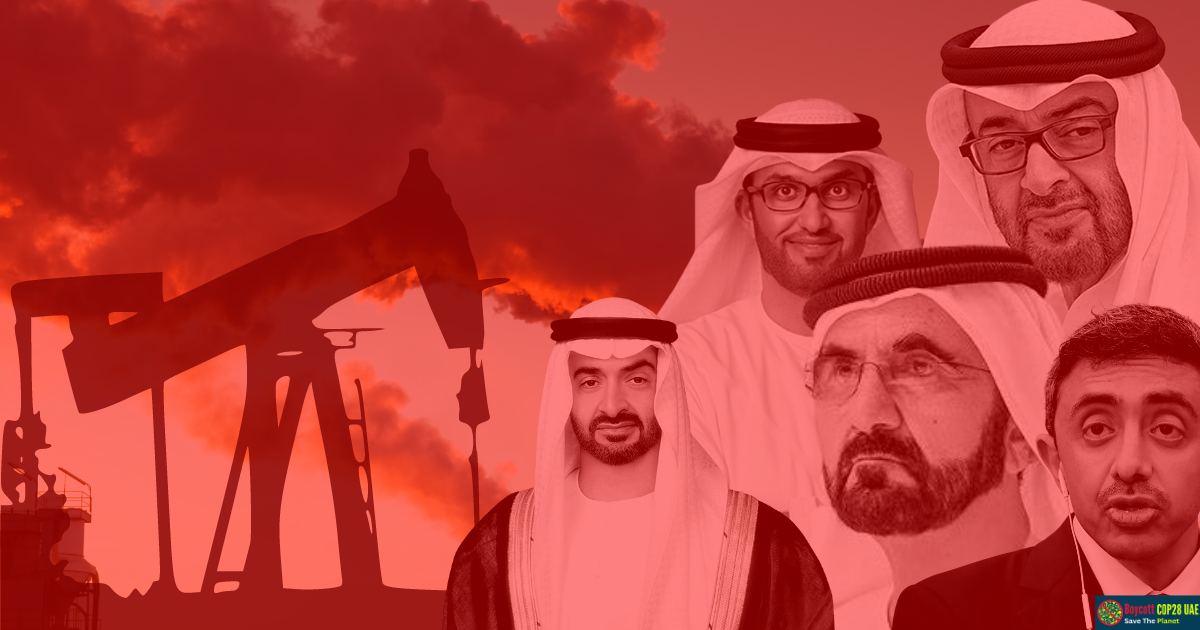The precedent setting host of this year’s UN Climate Conference of the Parties COP28 is an oil executive from the United Arab Emirates (UAE), the world’s seventh-largest oil producer. The president designate for the 2023 UNFCCC meeting is Sultan Ahmed Al Jaber, the CEO of Abu Dhabi National Oil Company (ADNOC). Annual COPs are convened under the United Nations Framework Convention on Climate Change (UNFCCC), which is an international treaty that aims to stabilize the global climate.
Many are asking how an oil CEO and a petrostate like the UAE can host the most important global climate summit since Paris. The fossil fuel industry is the largest single source of emissions and as such it is the leading driver of the climate crisis and a threat to civilization. Oil, gas and coal also cause a wide array of environmental, social, and economic harms. The air pollution generated by the extraction and burning of hydrocarbons is known to cause millions of premature deaths each year.

URGENT NEED FOR CLIMATE ACTION
The urgency of our current situation cannot be overstated, yet despite this urgency, we are not doing anywhere near enough. To minimize the impacts of climate change we must reduce carbon and other greenhouse gas emissions. The goal is to keep temperatures within the critical thresholds agreed to at COP21 in Paris (1.5°C or 2.7°F above preindustrial norms).

As succinctly summarized by biologist and elder, David Suzuki, the world has “failed to heed the increasingly urgent warnings.” UN secretary general António Guterres underscored the insufficiency of current efforts when he said the 2022 Intergovernmental Panel on Climate (IPCC) report reveals “a litany of broken climate promises”. With only seven years to cut global carbon emissions in half, we are sleepwalking into disaster. “It’s now or never, if we want to limit global warming,” said IPCC Working Group III co-chair Jim Skea in a U.N. news release. “Without immediate and deep emissions reductions across all sectors, it will be impossible,” Skea added.
The AR6, the latest IPCC synthesis report, catalogs current widespread climate impacts and indicates these impacts will get far worse if we fail to act. The AR6 and previous IPCC reports say we need urgent and timely action to ward off disaster.
WE NEED TO END ENERGY PRODUCTION FROM FOSSIL FUELS
The answers to the climate crisis are multifaceted but at the core, it is about the phasing out of fossil fuels. As argued in a Phy Org article, ending fossil fuels is the best and only way to minimize climate impacts.
The IPCC report is a synthesis of the best science we have, and the AR6 has been described by Guterres as a “guide to defuse the climate timebomb”. The AR6 is clear, there can be no new fossil fuel development or infrastructure if we are to meet the goals laid out in the Paris Agreement.
Climate scientists, governments, and NGOs agree that we must stop using fossil fuels as soon as possible. According to a plethora of studies including recently published research in the Journal Nature, radical reductions in fossil fuel use are required to meet the Paris targets. Inside Climate News quotes the study’s lead researcher Daniel Welsby as saying the facts are unequivocal, there is “inescapable evidence that…global production [of fossil fuels] has to start declining”. The International Energy Agency (IEA) echoes the sentiment saying we need to stop all new fossil fuel development to avoid the worst impacts of global warming.
Multiple independent streams of research all come to the same conclusion; we must quickly transition away from fossil fuels. It is not overly facile to say that ending fossil fuels is as close to a climate panacea as there is in the world today. The wealthy countries that comprise the G7 recently acknowledged the need to reduce fossil fuels to “fully or predominantly” decarbonize the power sector by 2035 or earlier and achieve full carbon neutrality by 2050.
To have a reasonable chance of a livable future, much of the known oil, gas, and coal deposits must be left in the ground. To have just a 50/50 chance of keeping temperatures below the prescribed limits, the production of oil and gas must start declining immediately and keep falling by 3 percent per year until 2050, coal production must decline much more steeply. That means that most of the known oil and gas reserves and almost all coal deposits must be left in the ground.
As reported by The Energy Mix, research from the Tyndall Centre for Climate Change Research indicates that wealthy countries must cut oil and gas by 76 percent by 2030, and eliminate it entirely by 2034. Kevin Anderson and Dan Calverley are two of the scientists that worked on the report, and they warned: “there is no room for any nation to increase production, with all having to make significant cuts this decade”.
INCREASING PRODUCTION CAPACITY FROM NON-RENEWABLE RESOURCES
Despite incontrovertible evidence and a scientific consensus calling for reductions in fossil fuel extraction, all the big oil companies increased production in 2022 and many by record levels. Even coal, the most destructive of the three major hydrocarbons, is increasing. Despite an overall decline in energy share, global coal consumption set a new annual record of 8 billion tonnes in 2022.
The fossil fuel industry has known it is the leading cause of climate change for decades and yet extraction and concomitant emissions are steadily increasing. The industry is currently pumping out more than 100 million barrels of oil daily and they are preparing to extract even more.

The UAE’s state-owned ADNOC and many other oil majors have massively expanded their investments in oil and gas extraction. OPEC (which includes the UAE) currently produces more than 31 million barrels of oil a day and according to a 2022 MEI analysis, production could increase by 15 percent or 4.5 million barrels a day in the near future. The industry as a whole has dumped $58 billion into projects over the past 2 years and an additional $23 billion of investments is planned this year. According to a Carbon Tracker report, titled Paris Maligned, this will augur a ‘climate catastrophe’.
Except for a brief decline during the Covid pandemic, the UAE has continually increased its crude oil production, and production capacity is expected to increase in the coming years. “So far, high-emitting governments and corporations are not just turning a blind eye; they are adding fuel to the flames by continuing to invest in climate-choking industries. Scientists warn that we are already perilously close to tipping points that could lead to cascading and irreversible climate effects,” Guterres said.
CONCLUSION
Holding a climate conference in a petrostate and appointing the CEO of an oil company to head the talks is a new low that erodes the credibility of the COP process. Oil and gas-producing states like the UAE promise to reduce emissions while they expand production. This is a red line we cannot cross if we want to stave off civilization-ending warming. As a petrostate that is increasing production, the UAE is in violation of UNFCC Article 2 on GHG mitigation, and as such it is a threat to the well-being of the planet and all its inhabitants. Simply put, fossil fuel interests are at odds with a livable future. We can have one or the other, we can’t have both.
It is with good reason that so many are shaking their heads in scorn and disbelief at the prospect of climate talks hosted by the fossil fuel industry. How can we let an industry that knowingly kills millions every year and vehemently fights to keep doing so –take the helm of the most important climate conference since COP21? How can an industry which augurs destruction on a planetary scale be regarded as an honest broker?
The fossil fuel industry wants a slow and gradual transition to keep raking in profits, however, it’s too late for that now, we just don’t have the time. If we want a livable future, we must learn to live in a world without hydrocarbons and we must do so quickly.






